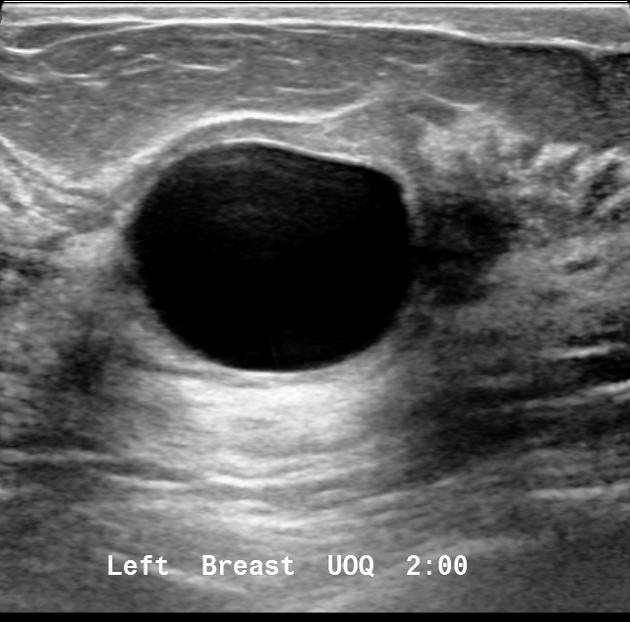Management and Determining the Cause
Chief Complaint: Breast Mass
a. History: No Co-morbidties
| Pivotal Assessment | Finding |
|---|---|
Ultrasound 2. Interpreting Ultrasound Findings
|
|
| Solid |
++++++++++
Molecular Markers
Molecular markers in the management of a breast mass are typically determined after a tissue biopsy confirms malignancy. Their assessment plays a critical role in guiding treatment decisions. The key stages for molecular marker evaluation include:
-
Core Needle Biopsy or Surgical Specimen Analysis – If malignancy is confirmed, molecular markers are assessed on the biopsy or surgical specimen.
-
Immunohistochemistry (IHC) and In Situ Hybridization (ISH) Testing – The standard molecular markers tested include:
- Estrogen Receptor (ER) and Progesterone Receptor (PR) – Determines hormone sensitivity and eligibility for endocrine therapy.
- Human Epidermal Growth Factor Receptor 2 (HER2) – Assesses HER2 overexpression, which influences targeted therapy options (e.g., trastuzumab).
- Ki-67 Proliferation Index – Measures tumor proliferation and helps in treatment stratification.
-
Genomic Profiling (If Indicated) – Additional molecular tests may be done, especially in hormone receptor-positive, HER2-negative cases to assess recurrence risk and chemotherapy benefit:
- Oncotype DX, MammaPrint, EndoPredict, or Prosigna – Predict recurrence risk and guide the use of chemotherapy in early-stage breast cancer.
When Are Molecular Markers NOT Determined?
- In benign breast masses (e.g., fibroadenomas, cysts).
- Before a biopsy confirms malignancy.
- If the tumor is in a setting where molecular testing wouldn't change management (e.g., very advanced disease with palliative intent).
Would you like more details on specific marker implications in treatment?
Certainly! The molecular markers in breast cancer guide treatment decisions in significant ways:
1. Hormone Receptor (ER/PR) Status
- ER+/PR+ (Hormone Receptor-Positive)
- Most common subtype (~70% of breast cancers).
- Treatment: Endocrine therapy (Tamoxifen, Aromatase Inhibitors, Fulvestrant).
- Chemotherapy?: Not always needed; genomic profiling (e.g., Oncotype DX) helps decide.
- ER-/PR-
- More aggressive and does not respond to endocrine therapy.
- Treated with chemotherapy if other markers (e.g., HER2) indicate.
2. HER2 (Human Epidermal Growth Factor Receptor 2) Status
- HER2-Positive (~15-20% of breast cancers)
- More aggressive but highly responsive to targeted therapy.
- Treatment: Anti-HER2 therapy (Trastuzumab, Pertuzumab, T-DXd).
- Chemotherapy?: Often combined with HER2-targeted therapy.
- HER2-Negative
- No benefit from HER2-targeted therapy.
- Treatment based on ER/PR status.
3. Triple-Negative Breast Cancer (TNBC) (ER-/PR-/HER2-) (~10-15%)
- More aggressive with fewer targeted options.
- Treatment: Chemotherapy is the primary approach.
- Immunotherapy: PD-L1 testing determines eligibility for checkpoint inhibitors (Atezolizumab, Pembrolizumab).
- BRCA Mutation Testing: If positive, PARP inhibitors (Olaparib, Talazoparib) may be used.
4. Ki-67 Proliferation Index
- High Ki-67 (>20-30%) suggests a more aggressive tumor, increasing likelihood of chemotherapy recommendation.
5. Genomic Profiling (Oncotype DX, MammaPrint, EndoPredict, Prosigna)
- Used in ER+/HER2-, node-negative or limited-node-positive cases.
- Predicts recurrence risk and need for chemotherapy.
Would you like recommendations based on a specific clinical scenario?
Managing a geriatric patient with a breast mass and cognitive decline requires addressesing both the potential malignancy and the cognitive impairment.
The goals should include maximizing quality of life and respecting the patient's wishes while ensuring appropriate medical care.
Assess frailty and tailor treatment plans to the patient's functional status.
If the patient’s cancer is advanced or they are frail, palliative care should be considered to manage symptoms and improve quality of life.
- Ensure that family or caregivers are well-informed and involved in discussions about treatment goals and end-of-life care preferences.
++++++++++++++++
4. Treatment Plan for Breast Mass
- Surgical Options: Careful consideration is necessary based on the patient's cognitive status and overall health.
- Breast-conserving surgery (lumpectomy) or mastectomy may be considered based on tumor size, location, and patient preference.
- Discuss anesthesia risks given cognitive decline, as some older patients may not tolerate general anesthesia well.
- Adjuvant Therapy: Depending on the cancer type, stage, and receptor status, options may include chemotherapy, radiation, hormone therapy, or targeted therapy. Consider the patient's overall frailty and life expectancy.
1. Comprehensive Evaluation
- Cognitive Assessment: Use tools such as the Mini-Mental State Examination (MMSE) or Montreal Cognitive Assessment (MoCA) to assess cognitive function.
2. Breast Mass Evaluation
- Imaging: Mammography and/or ultrasound to characterize the breast mass. In elderly patients, breast tissue may be more fibrous, making it harder to evaluate. If the mass is suspicious, consider a biopsy (e.g., fine needle aspiration or core needle biopsy).
- Pathology: Depending on the biopsy results, determine whether the mass is benign (e.g., fibroadenoma, cyst) or malignant (e.g., invasive ductal carcinoma).
3. Management of Cognitive Decline
- Cognitive Evaluation: Determine the underlying cause of cognitive decline. It could be due to dementia, delirium, depression, or other factors.
- Medication Management: Adjust any medications that may worsen cognitive function (e.g., anticholinergics, benzodiazepines).
- Supportive Care: Engage caregivers or family members for assistance in decision-making, treatment adherence, and daily care needs.
6. Long-Term Considerations
- Supportive Services: Provide access to social work, home health, and community resources for ongoing support.
